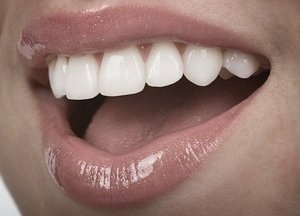What are dental veneers?
Dental veneers are wafer thin yet strong and durable porcelain laminates. The minimally invasive procedure is used to restore the colour, surface, shape and alignment of your teeth.
Shaped to perfectly mask and disguise imperfections, dental veneers will function as a normal tooth when you eat and their durable and strong material mean you can continue to bite, chew and enjoy all your favourite foods without worrying about the consequences.
If you don’t feel confident when you smile, maybe because your teeth are discoloured, chipped or uneven, then veneers are your answer. They're perfect if your teeth are just a little twisted or you’ve been looking for a solution without the need for orthodontics or braces.
By removing the smallest amount of enamel from the front of your tooth and replacing it with a thin porcelain shell, which is bonded onto your existing tooth, you are left with a strong, straight and natural-looking smile.
How the procedure works
Following a thorough examination, the procedure will involve preparing your teeth by shaping them and taking a thin layer of enamel from the surface. This ensures your smile doesn't look or feel bulky once the veneers are in place.
We'll take an impression (or mould) of the area, and then send this to the laboratory so the veneers can be custom-made to precisely the right shade and shape to suit you.
Once ready, the veneers are bonded into place, becoming virtually part of your own teeth and creating a beautiful, natural look. Dental veneers will boost your smile, they're suitable for the majority of patients and having them fitted is very straightforward.
Invisalign and veneers
Invisalign can be used in combination with veneers to correct chipped or discoloured teeth. With veneers, the surface of the natural tooth enamel is irreversibly removed. However, if straightening is performed first using the Invisalign system, it is highly likely that less enamel will need to be removed.
Using veneers on their own as a method to help straighten teeth may result in having to remove more enamel than necessary. Also, as veneers are not a permanent solution, you may need to replace them due to chipping or breaking. We therefore recommend a combination of Invisalign and veneers for a long-lasting solution.
“I have always found both Jane and her staff to be absolute professionals; they act with great discretion, and are completely reliable. I couldn’t and wouldn’t recommend anyone more highly and more accomplished than Dr. Jane Butterworth.”
or call us today
01925 75 22 09

Dental veneers FAQs
What is involved in getting a dental veneer?
Getting a porcelain veneer is usually a 3 step process. The first step is to book a consultation with us. At this visit, you can chat about your concerns and we will explain how veneers will work for you. The second step is to prepare the tooth for the veneer. A small amount of tooth structure is removed and an impression is taken. The dentist will then place temporary veneers. At your third appointment, the temporaries are removed and the final veneer is bonded to your tooth.
Why do I need dental veneers?
Dental veneers are an excellent cosmetic solution for patients with discoloured, worn down, chipped, misaligned, uneven or irregularly shaped teeth.
How long do dental veneers Last?
Typically, a veneer lasts approximately 5-10 years. They do not require any special care other than regular brushing, flossing and visits to the dentist.







